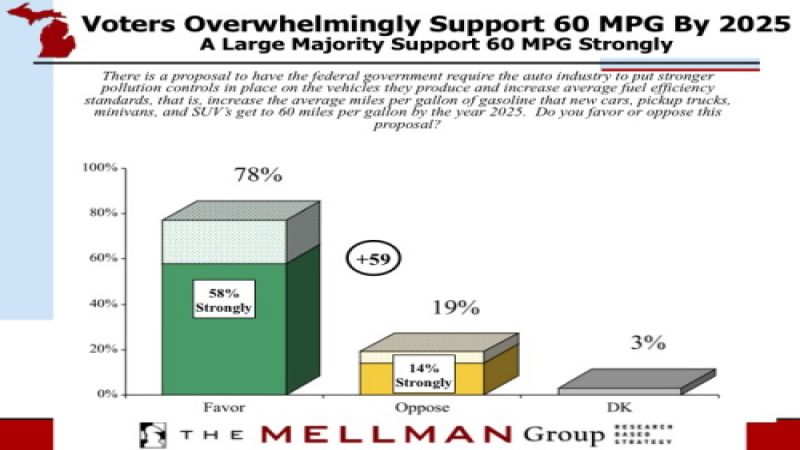"The American voter – the American consumer – is speaking loudly in these key states,” said Ceres President Mindy Lubber. “It isn’t just $4-a-gallon fatigue. These voters clearly recognize that our economic, environmental and national security futures are also rolled up in saving money at the pump and making America far more energy independent.”
People who were polled said more fuel-efficient vehicles will bolster the Midwest economy, help to create jobs, reduce the cost of driving and lessen U.S. reliance on imported oil.
Findings:
80% of likely Ohio voters and 76% of likely Michigan voters say a 60 mpg standard will protecting U.S. auto jobs.
Increasing vehicle fuel efficiency will pay for itself.
87% of likely voters in Michigan and 90% of likely voters in Ohio say it is “important” or “very important” to take action now to increase fuel efficiency.
59% of likely voters in Ohio and 56% of likely voters in Michigan accurately believe benefits outweigh the price of paying for fuel efficiencies.
"Michigan voters overwhelming support for higher fuel efficiency standards by 2025 matches what is technologically feasible," John DeCicco, a faculty fellow at the University of Michigan's Energy Institute, said in a statement.
His report, "A Fuel Efficiency Horizon for U.S. Automobiles," shows how optimal use of technologies can push new fleet efficiency to 74 mpg under the right circumstances.
“Voters in these two presidential battleground states overwhelmingly support stronger vehicle standards because they believe higher standards will create American jobs and make (Detroit Three) auto companies more competitive,” said Mark Mellman, president of The Mellman Group.
“This support cuts across traditional demographic, political and industrial boundaries. This is a real and serious issue to voters, with super-majorities considering increased fuel efficiency not just an important issue, but (also) a very important issue.”
Michigan overwhelmingly supports 60 mpg this way, according to the poll:
Democrats (91% to 9%), Republicans (65% support, 31% oppose), and Independents (71% to 22%).
Conservatives (67% support, 29% oppose), moderates (76% to 19%), and liberals (92% to 7%).
Men and women, truck and SUV owners, likely voters from Detroit, Flint and Grand Rapids— all support 60 mpg.
Ohio also strongly favors 60 mpg:
Democrats (89% to 8%), Republicans (68% support, 29% oppose), and Independents (77% to 18%)
Conservatives (69% support, 28% oppose), moderates (81% to 13%), and liberals (89% to 8%)
Men and women, truck and SUV owners, voters from auto industry households—all support 60 mpg
A 60 mpg average fuel economy by 2025 would mean increasing fuel economy by 6 percent a year over the current 2016 standard of 35 mpg. Proposed standards will be set by September.
The Mellman Group survey of 1,600 "likely" voters in Michigan and Ohio was conducted April 9-12 and has a margin of error of +/- 3.5%.
You can reach TorqueNews.com's Hawke Fracassa at [email protected].
Image source: Mellman Group










